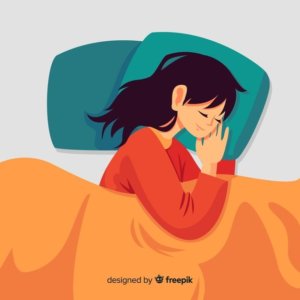
Sleep is kind of a big deal
Sleep is a critical need for not only the human body, but all mammalian lifeforms known to us. The process and purpose of sleep is one that only recently is being understood more than simply “We need it”. However, sleep scientists are starting to better understand what sleep does, why we need it, and how to get more of it. To dip our toes into the subject, first step is to understand how our body responds to sleep and the distinct stages of our sleep cycle. Check out this video for a great breakdown!
The most agreed upon theory in modern medicine is the Restorative Theory. As put by Malow & Shelton (2021) “Sleep “restores” and repairs what is lost in the body
when we are awake. Think of sleep as a reset button, similar to restarting our computers so they work better.” (p. 43)
Stages of sleep
- (Non-Rapid Eye Movement) NREM Sleep
- Stage 1: Awake
- Stage 2: Light Sleep
- Stage 3: Deep sleep
- REM Sleep
NREM vs REM sleep is recognized as very distinct from each other. As our body and brains respond differently during each. Initially we go through a cycle of NREM Sleep starting at light, entering deep, and rising back to light. After a full cycle of this is completed we enter REM sleep. During which our brain is very active. This is also the stage of sleep where we dream!
But why do we need to sleep?
The detriments of getting an improper sleep are well known to most, if not all of us. To name a few, fatigue, mental fog, headaches, and decreased control of our emotions. Chronically not getting enough sleep can also increase chances of heart disease, depression, and even cancer.
A large reason why this is can be ascribed to something which is now ever-present in our daily life, electronic screens. This is the primary “big bad” when we are talking about sleep disrupters. The blue light which our devices emit tricks our circadian rhythm into thinking it’s still daylight out, inhibiting the production of melatonin.
Hazards of Chronic Fatigue
- Depression
- High blood pressure
- Heart disease
- Reduced immune system function
- Impaired emotional regulation
- Cognitive “fog”
- Muscle aches
- Headaches
- And many more…
But what can we do about it?
Getting better sleep takes some work. A lot of us have developed unhealthy routines which make it more difficult to get a proper night’s rest. The most common of which is simply not giving ourselves enough time to sleep!
Trying to catch up on sleep doesn’t work either, especially if you attempt to do so through naps. All that a nap does is throw off your sleep for the upcoming night, particularly if you take a nap after 3:00pm.
What to do
- Keep screens out of the bedroom, and don’t use them an hour before bed
- Ensure a dark, calm space to get your rest in
- Don’t lay in your bed unless you intend on falling asleep
- If you don’t fall asleep in 15 min, get out of bed (to help build association of bed=sleep)
Taking these steps may seem like a large change, especially if you’re used to scrolling on your phone before bedtime. Although according to modern sleep science, you won’t regret it after your trip to dreamland!
References:
Fleming-Michael, K. (2003). The Sleep Factor. Soldiers, 58(10), 38.
How to Sleep Better. (2020). TIME Magazine, 196(7/8), 77.
Malow, B., & Shelton, A. R. (2021). Why Do We Sleep? Exceptional Parent, 51(6), 42–44.
Smith, M. G., Cordoza, M., & Basner, M. (2022). Environmental Noise and Effects on Sleep: An Update to the WHO Systematic Review and Meta-Analysis. Environmental Health Perspectives, 130(7), 076001-1-076001-23. https://doi.org/10.1289/EHP10197

